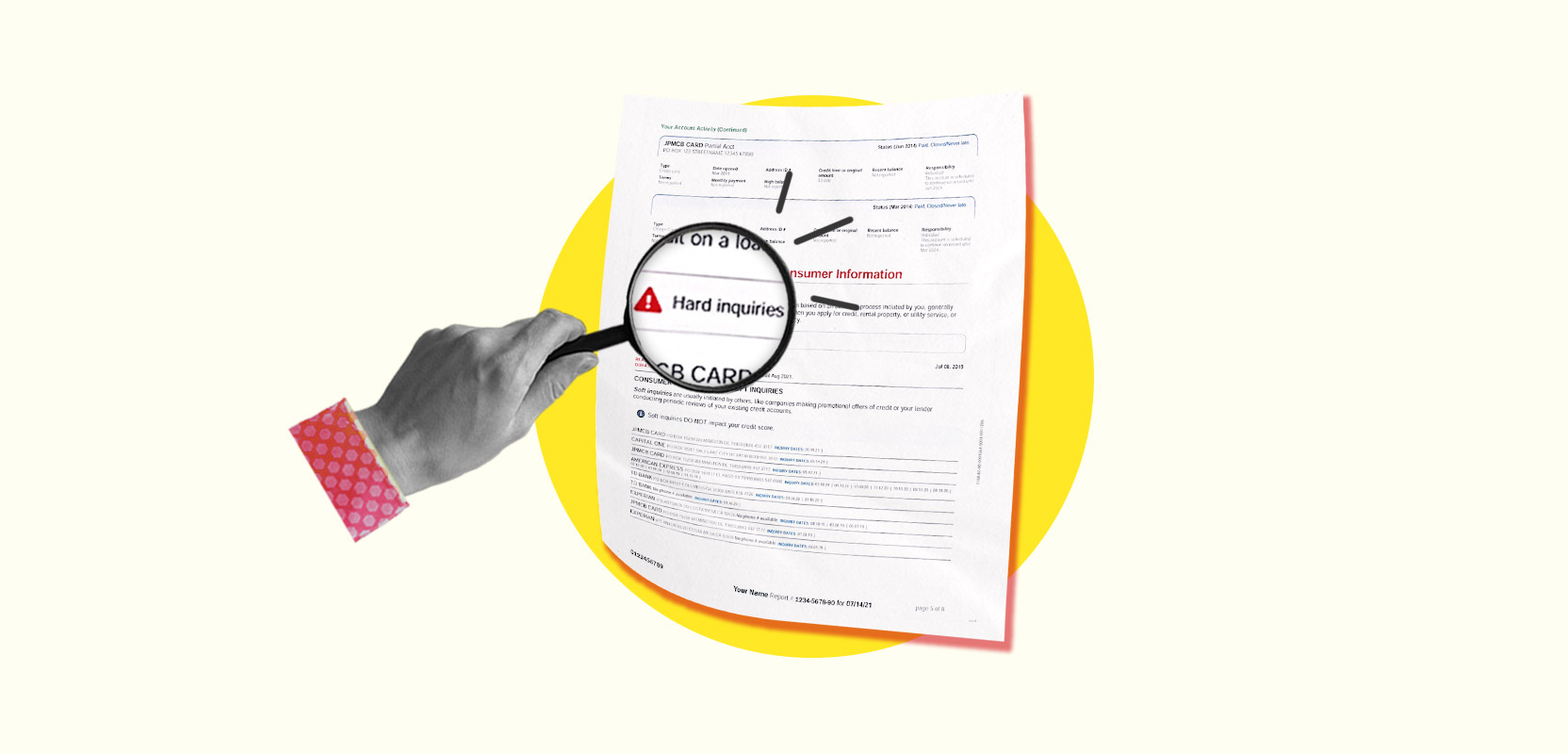

Finance
How Long For Hard Credit Inquiry To Be Removed
Published: March 4, 2024
Learn how long it takes for a hard credit inquiry to be removed and its impact on your finances. Understand the timeline and steps to improve your credit.
(Many of the links in this article redirect to a specific reviewed product. Your purchase of these products through affiliate links helps to generate commission for LiveWell, at no extra cost. Learn more)
Table of Contents
What is a Hard Credit Inquiry?
A hard credit inquiry, also known as a hard pull or hard credit check, occurs when a financial institution, such as a lender or credit card issuer, reviews your credit report as part of their decision-making process. This typically happens when you apply for a loan, mortgage, credit card, or any other form of credit. Unlike a soft credit inquiry, which may occur when a company pre-approves you for a credit offer or when a potential employer conducts a background check, a hard credit inquiry requires your explicit consent and can impact your credit score.
When a hard credit inquiry is made, it is recorded on your credit report and may have a temporary effect on your credit score. Understanding the implications of hard credit inquiries and how long they remain on your credit report is crucial for managing your overall credit health. In this article, we will delve into the details of hard credit inquiries, their impact on your credit score, and the methods to remove them from your credit report. By gaining insight into these aspects, you can take proactive steps to maintain a healthy credit profile and make informed financial decisions.
What is a Hard Credit Inquiry?
A hard credit inquiry, also known as a hard pull or hard credit check, occurs when a financial institution, such as a lender or credit card issuer, reviews your credit report as part of their decision-making process. This typically happens when you apply for a loan, mortgage, credit card, or any other form of credit. Unlike a soft credit inquiry, which may occur when a company pre-approves you for a credit offer or when a potential employer conducts a background check, a hard credit inquiry requires your explicit consent and can impact your credit score.
When a hard credit inquiry is made, it is recorded on your credit report and may have a temporary effect on your credit score. Understanding the implications of hard credit inquiries and how long they remain on your credit report is crucial for managing your overall credit health. In this article, we will delve into the details of hard credit inquiries, their impact on your credit score, and the methods to remove them from your credit report. By gaining insight into these aspects, you can take proactive steps to maintain a healthy credit profile and make informed financial decisions.
How Long Does a Hard Credit Inquiry Stay on Your Credit Report?
Once a hard credit inquiry is initiated, it remains on your credit report for a period of two years. During this time, it is visible to any entity that reviews your credit report, including other potential lenders or creditors. While the inquiry’s presence on your report is not inherently negative, multiple hard inquiries within a short timeframe can raise concerns for lenders, as it may indicate that you are taking on significant amounts of new debt or facing financial difficulties.
It’s important to note that although hard inquiries are visible on your credit report for two years, their impact on your credit score diminishes over time. Typically, the initial impact of a hard inquiry on your credit score is minimal, often resulting in a temporary decrease of a few points. As time passes, the impact lessens, and after one year, the hard inquiry may no longer affect your credit score at all. However, it remains on your credit report for the full two-year period before being automatically removed.
Understanding the duration of hard credit inquiries on your credit report is essential for managing your credit applications strategically. By being mindful of the timing and frequency of credit inquiries, you can minimize their impact on your credit score and demonstrate responsible credit behavior to potential lenders.
Impact of Hard Credit Inquiries on Your Credit Score
Hard credit inquiries can have a temporary impact on your credit score, albeit a modest one. When a lender or creditor pulls your credit report as part of a hard inquiry, it signals that you are actively seeking new credit. This can raise concerns about your ability to manage additional debt responsibly, especially if multiple inquiries occur within a short timeframe. As a result, your credit score may experience a slight decrease, typically ranging from 5 to 10 points, due to the presence of a new hard inquiry.
While the initial decrease in your credit score may be minimal, it’s important to consider the cumulative effect of multiple hard inquiries. If you apply for several credit cards or loans within a short period, the collective impact of these inquiries can become more pronounced, potentially signaling to lenders that you are facing financial challenges or overextending your credit. Consequently, this may affect your ability to secure favorable terms on new credit applications.
However, it’s crucial to emphasize that the impact of hard inquiries on your credit score is temporary. Over time, typically within 12 months, the influence of a hard inquiry diminishes, and it may no longer affect your credit score. Additionally, as the hard inquiry approaches the two-year mark on your credit report, its impact becomes negligible, further minimizing any potential effects on your credit score.
Understanding the transient nature of the impact of hard credit inquiries on your credit score empowers you to make informed decisions about credit applications. By spacing out credit inquiries and being mindful of their potential impact, you can maintain a healthy credit score and enhance your overall creditworthiness.
How to Remove Hard Credit Inquiries from Your Credit Report
Removing hard credit inquiries from your credit report involves understanding the permissible methods for addressing inaccurate or unauthorized inquiries. While legitimate hard inquiries cannot be removed, erroneous or unauthorized inquiries can be disputed and potentially eliminated from your credit report. Here are the steps to take:
- Review Your Credit Report: Obtain a copy of your credit report from each of the three major credit bureaus – Equifax, Experian, and TransUnion. Carefully scrutinize the report to identify any unauthorized or inaccurate hard inquiries that may have been initiated without your consent.
- File a Dispute: If you identify unauthorized or inaccurate hard inquiries, file a dispute with the respective credit bureau. This can typically be done online, by mail, or over the phone. The credit bureau will investigate the disputed inquiry and either verify its accuracy or remove it from your credit report if it is found to be erroneous.
- Follow Up: After filing a dispute, monitor the progress of the investigation and follow up with the credit bureau if necessary. Be prepared to provide any supporting documentation that substantiates your claim of an unauthorized or inaccurate hard inquiry.
- Exercise Caution: Be cautious of companies or individuals that claim to remove legitimate hard inquiries from your credit report for a fee. Legitimate hard inquiries, which result from your credit applications, cannot be removed through unauthorized means. Only inaccurate or unauthorized inquiries can be legitimately disputed and potentially removed.
It’s important to note that the removal of a disputed hard inquiry, if successful, can lead to an improvement in your credit score. By ensuring the accuracy of the information on your credit report and addressing any unauthorized inquiries, you can maintain a more precise reflection of your credit history and bolster your overall credit standing.
Factors That Affect the Timeframe for Removal
The timeframe for the removal of hard credit inquiries from your credit report can be influenced by several factors, impacting the efficiency of the dispute resolution process and the subsequent updates to your credit report. Understanding these factors can provide insights into the duration of the removal process:
- Credit Bureau Procedures: Each credit bureau has its own procedures for investigating and addressing disputed inquiries. The efficiency and thoroughness of their processes can impact the timeline for the removal of inaccurate or unauthorized inquiries from your credit report.
- Accuracy of Documentation: The accuracy and completeness of the documentation provided to support your dispute can significantly influence the resolution timeframe. Providing clear and compelling evidence of an unauthorized or inaccurate inquiry can expedite the removal process.
- Volume of Disputes: The workload and volume of disputes being handled by the credit bureaus can affect the speed at which your dispute is processed. High volumes of disputes may lead to longer processing times.
- Communication and Follow-Up: Effective communication and diligent follow-up on your part can help expedite the resolution of your dispute. Regularly monitoring the status of your dispute and promptly providing any requested information can contribute to a swifter resolution.
- Legal Requirements: Adherence to legal requirements, such as the Fair Credit Reporting Act, governs the dispute resolution process. Compliance with these regulations can introduce specific timelines and procedures that impact the removal of disputed inquiries.
By considering these factors, you can gain a clearer understanding of the variables that influence the timeframe for the removal of hard credit inquiries from your credit report. While the process may require patience, thoroughness, and persistence, successfully addressing inaccurate or unauthorized inquiries can lead to an improved and more accurate representation of your credit history.
Conclusion
Understanding the intricacies of hard credit inquiries and their impact on your credit report is integral to managing your overall credit health. While hard inquiries may have a temporary effect on your credit score, their significance diminishes over time. By being mindful of the duration of hard inquiries on your credit report and the potential impact on your credit score, you can strategically manage your credit applications and demonstrate responsible credit behavior to potential lenders.
Additionally, the ability to remove inaccurate or unauthorized hard inquiries from your credit report through the dispute resolution process empowers you to maintain a more precise representation of your credit history. By diligently reviewing your credit report, filing disputes when necessary, and following up on the progress of the investigations, you can address erroneous inquiries and potentially improve your credit score.
Factors such as credit bureau procedures, the accuracy of documentation, dispute volumes, communication, and legal requirements can influence the timeframe for the removal of disputed inquiries. By considering these variables and actively participating in the dispute resolution process, you can navigate the removal of inaccurate inquiries more effectively.
Ultimately, the knowledge and proactive management of hard credit inquiries contribute to a more informed approach to credit applications and financial decisions. By leveraging this understanding, you can maintain a healthy credit profile, enhance your creditworthiness, and pursue your financial goals with confidence.














